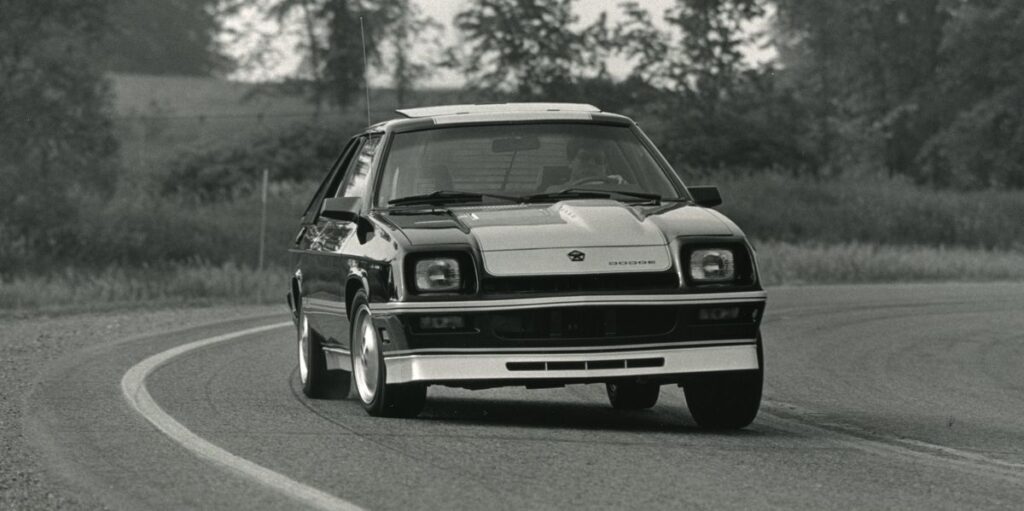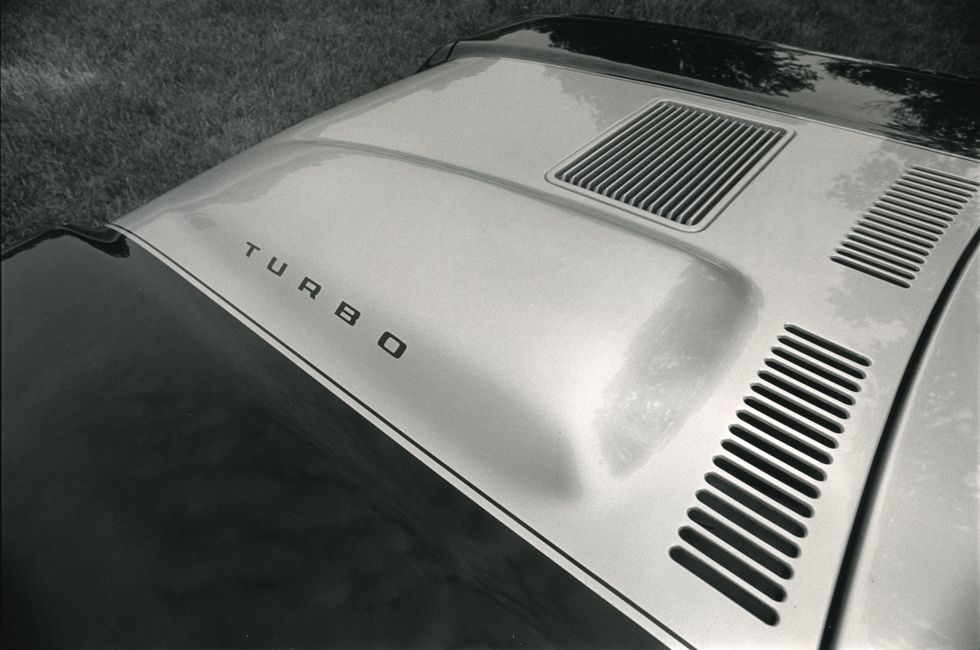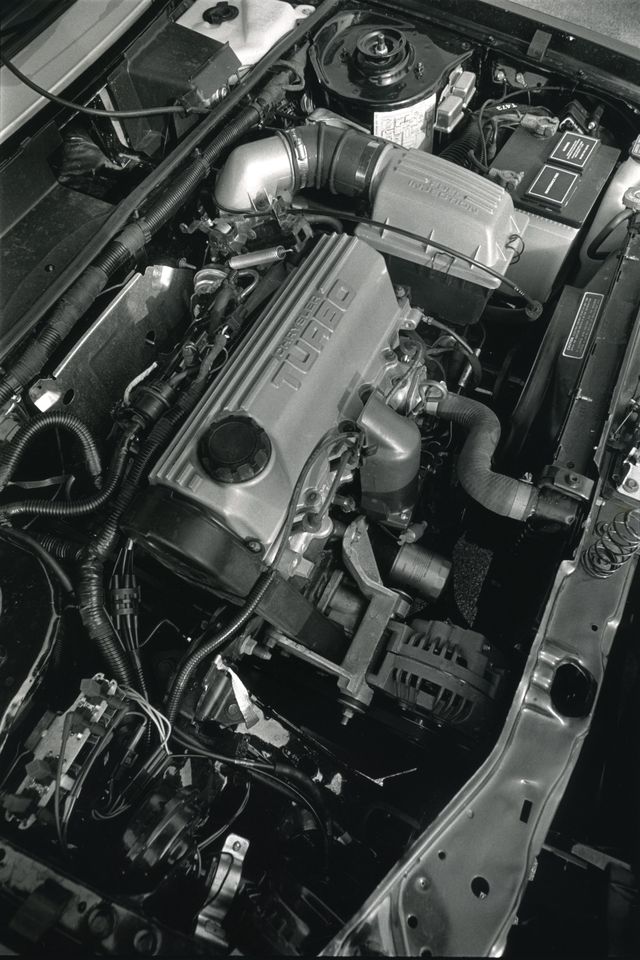1985 Dodge Shelby Charger Turbo Highlights the Shelby-Mopar Mashup

From the October 1984 issue of Car and Driver.
Score one for those close-lipped Chrysler engineers and mechanics who keep better track of their beery conversations with us at the local watering hole than we thought. There we were, on 1985-model preview day at the Chrysler Proving Grounds, driving a very real, production-ready turbocharged Shelby Charger. We were about as unprepared for this blessed event as any self-respecting, well-informed, inquisitive automotive journalist could be.
We’re not stupid. We know that Chrysler’s been running stuffed Shelbys around the test track and through the wind tunnel for over a year. We just didn’t know when, if ever, the real deal would come to pass. We could only imagine the outcome of a street fight between the lighter-by-200 pounds back-alley Shelby and the technologically “superior” Daytona. With equal turbo engines, the more expensive Daytona would obviously be lunch meat for the feisty Shelby. Would Chrysler really let that scenario play on Main Street, U.S.A.?
Dick Kelley|Car and Driver
Apparently, some verrry persuasive product planners convinced the marketing types that the Daytona owners would be home getting a good night’s sleep when the Shelby bad boys headed out to play. The planned midnight-snack menu would, instead, include the likes of the Pontiac Sunbird Turbo, the Toyota Celica GT, the Renault Fuego Turbo, the Datsun 200SX Turbo, and Mitsubishi’s Cordia Turbo. So Chrysler decided that the world was big enough for both a Daytona Turbo and a Shelby Turbo.
The 2.2-liter turbocharged four-cylinder is better than ever this year, with an electronic waste-gate control capable of allowing 9 psi of boost for ten seconds, after which it settles back to 7 psi. The added pressure ups the turbo’s horsepower rating from 142 to 146 in full-boost mode. How well does the Shelby deliver all that power to the ground, you ask? After a couple of lightning laps around the proving grounds in a pre-production prototype, we’d say that the company’s 7.6-second 0-to-60-mph claim is entirely plausible. Compare that with the normally aspirated Shelby’s nine-second time, which we ran up the flagpole and saluted in April 1983.

Dick Kelley|Car and Driver
Slipping the compact 2.2 turbo into the Shelby’s smaller engine bay was accomplished with relative ease. The front-box section of the Shelby’s frame and the engine mounts were strengthened to withstand the increased torque loads, and the hood was bulged to accommodate the air cleaner. In addition, several Daytona Turbo pieces were modified for combat duty in the Shelby: a larger-capacity radiator, larger rear brakes, upgraded internal transmission parts, a more efficient firewall heat shield, and shortened versions of the chassis and engine wiring harnesses.
The most important components carried over from the Daytona to the Shelby were equal-length driveshafts, an excellent answer to the torque-steer problem. No nasty undertow threatens to sweep the Shelby’s front wheel out from under control when the gas pedal is goosed; Carroll’s car is as straight and true as its more sophisticated mentor.

Dick Kelley|Car and Driver
The Charger Turbo is the only Shelby for 1985, and its new image inspired the development engineers to tighten up the rest of the little street rocket’s act. Changes to the internal valving of the power-steering unit improve its already exemplary feel. The spring rates are recalibrated, and gas-pressurized shocks appear at all four corners; the combination is a tremendous improvement over last year’s harsh ride quality (assuming the prototype here is true to production). Unidirectional Goodyear Eagle VR50 205/50VR-15 tires replace 195/50s. Even the seats have received attention, in the form of more supportive backs and side bolsters and additional lumbar padding. About midyear, the Shelby will also get the new Lancer’s dual-rail five-speed manual shifter to replace the current, slightly balky shifter.
As a package, the Shelby Charger has hoed a long row from its 1982 fall debut as a crude but effective boy racer. Yet its marvelous sense of purpose—pure, unadulterated performance for under $10,000—is stronger than ever. Says the Shelby Turbo’s main champion, Ken Mack, chief product planner in charge of subcompact and specialty cars, “It’s an extension of the original Shelby philosophy: If you want to go fast and you don’t want to spend a lot of money, the Shelby Charger is for you. Simply stated, it offers more bang for your buck.”
1985 Dodge Shelby Charger Turbo
Vehicle type: front-engine, front-wheel-drive, 5-passenger, 3-door sedan
Estimated base price: $9200
Engine type: turbocharged inline-four, iron block and aluminum head, Chrysler electronic fuel injection
Displacement: 135 cu in, 2213 cc
Power: 146 hp @ 5200 rpm
Transmission: 5-speed manual
Wheelbase: 96.5 in
Length: 174.8 in
EPA Fuel Economy, city: 19 mpg



